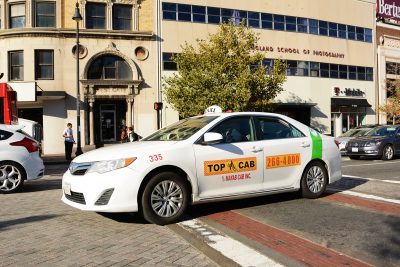
The Boston Taxi Owners Association filed a lawsuit against Gov. Charlie Baker and other Massachusetts officials Friday, claiming a new law passed last month regarding “transportation network companies” is unconstitutional.
The law regulates TNCs, like Uber and Lyft, differently than taxicabs, allowing the TNCs to bypass some driving regulations having to do with vehicle and driver registration, insurance and fares that Boston taxis still have to abide by.
The union’s lawsuit states TNCs are not held to the same standards as taxi drivers. TNCs are allowed to operate without paying city licenses, known as medallions, which tend to become very expensive, the lawsuit said.
Jenifer Pinkham, an attorney representing the union, said members of the association believe taxi drivers are receiving unequal treatment from the state. She said the association thinks the state is explicitly differentiating taxi drivers and TNCs in an unfair way, which the union finds to be unconstitutional.
Pinkham said because both TNCs and taxis provide transportation-for-hire services, the constitution requires the government to regulate them in the same way.
“The constitution requires that similarly situated businesses be treated the same way,” Pinkham said. “We feel that transportation network companies provide the same service that taxis provide.”
Pinkham compared the issue to an Asian restaurant and an Italian restaurant that both provide the same service. “Both are restaurants, so they need to be regulated in the same manner,” Pinkham said.
The taxi owners hope to achieve fairness and equality through this lawsuit, according to Pinkham.
“[The taxi owners] just want to be treated the same way as TNCs, and they want a level playing field so that they can continue to operate, can continue to compete and are not driven out of business,” Pinkham said.
Uber and Lyft did not respond to requests for comment.
Billy Pitman, a spokesperson for Baker, said in a statement that Baker is proud of the legislation regarding TNCs, and believes the people of Massachusetts will benefit from the safety precautions the bill outlines.
“Governor Baker, in collaboration from the legislature, was pleased to recently sign legislation establishing a regulatory framework for transportation network companies that didn’t previously exist and prioritizing public safety, including some of the strongest ride-for- hire background check systems in the nation,” Pitman said.
Baker does not usually comment on pending legislation, although he has made it clear to TNCs and the union that his administration is open to discussing the issue further, Baker’s office said.
Boston residents seemed to favor TNCs, and don’t necessarily agree with the taxi owners’ lawsuit.
Mike Schreiber, 29, of South Boston, a frequent Uber customer, expressed support for the law, and said he doesn’t know if the taxi drivers can cite the law as being unconstitutional.
“The taxi drivers are just mad because Uber is a better service,” he said
Joshua Mercado, 21, of South Boston, who mainly uses Uber, said he thinks the law is constitutional, but does sympathize with the taxi owners.
“I can see where they’re coming from,” he said. “They’re losing business, but Uber is cheaper and more convenient.”
Alan Clay, 70, of Fenway, said he believes that the lawsuit is a lost cause. While he does not use TNCs necessarily, he said he knows taxis are becoming a thing of the past.
“When technology changes, society has to change as well,” he said.




